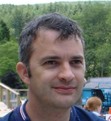Tim C. Taylor's Blog, page 20
October 4, 2011
I'm interviewed on Goodreads.com
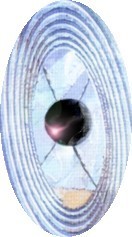
 I talk about my new time-travelling, steampunk novella, Last Man Through the Gate, and about Greyhart Press.
I talk about my new time-travelling, steampunk novella, Last Man Through the Gate, and about Greyhart Press.
The interview is over at GoodReads.








CERN FTL Neutrinos — evidence of travel through higher dimensions?
If, like me, you love your science fiction and the science that goes behind it, you can't have failed to notice the astonishing news stories in recent days about the CERN Large Hadron Collider (LHC) team. They have recorded neutrinos travelling faster than the speed of light. Is this truly evidence of faster-than-light (superluminal) travel?
At first I couldn't help thinking this was evidence that my son has god-like powers. He'd built a Lego spaceship the week before and I'd taught him that superluminal is a better word than superfast because nothing travels at superluminal speeds. Then, after a week where my lad uses superluminal in every other sentence, CERN proves me wrong.
Except CERN haven't proven anything, not according to Large Hadron Collider scientists themselves. Despite having the biggest and best particle accelerator in the world, with all the corresponding recording equipment, the team bent over backwards to stress that they are merely presenting their findings for peer review.
 Wouldn't it be great, though, if peer review confirmed the LHC team's findings! Fans of science fiction fans and fantasy have long enjoyed stories of travel between dimensions or various forms of FTL spaceship drive, stories with varying degrees of attention to the mechanics of that travel. That is doubly true for science fiction authors. In another personal coincidence, the news resonated with me last week as I published a novella called Last Man Through the Gate, which deals with travel between dimensions. Like many other authors, I evade the issue of how the travel is possible; instead I concentrate on how making the journey isolates the traveller.
Wouldn't it be great, though, if peer review confirmed the LHC team's findings! Fans of science fiction fans and fantasy have long enjoyed stories of travel between dimensions or various forms of FTL spaceship drive, stories with varying degrees of attention to the mechanics of that travel. That is doubly true for science fiction authors. In another personal coincidence, the news resonated with me last week as I published a novella called Last Man Through the Gate, which deals with travel between dimensions. Like many other authors, I evade the issue of how the travel is possible; instead I concentrate on how making the journey isolates the traveller.
So, to return to the original question, has the LHC team given us evidence of travel through higher dimensions? At present, we have to conclude: 'no' — or, at least: 'not yet'.
However, the LHC team did provide compelling evidence of something else: that despite the rise of anti-science in recent years, the scientific method is alive and well in even the most expensive and prestigious teams. Is the Large Hadron Collider good value for the taxpayers who funded it, or could human knowledge have been advanced more efficiently by avoiding the lure of the being able to say: our particle accelerator is bigger than yours? I'm not longer sure where I stand on that. However, I do know that, in a world of austerity that seems to shrink further into mistrust and ignorance with every day, the manner in with the LHC team have reported their findings shines a beacon of truth and excellence into the suffocating blanket of ignorance. Well done to you all!








September 30, 2011
Last Man Through the Gate is launched
 My first novella has just been released. It's a steampunk, time-travel tale of… Actually, here's a fine description:
My first novella has just been released. It's a steampunk, time-travel tale of… Actually, here's a fine description:
"Tim C. Taylor surprises us with worlds at strange angles to ours, and to each other, in a delicious piece of writing which ramps up excitingly through time distortions, grief, conflict, and peril, to paradoxical revelation. An excellent and provocative read."
That's what award-winning author, Warhammer 40k legend, movie scriptwriter, and sometime ghost of honour, Ian Watson had to say about it. With such an impressive résumé, who am I to better Ian's description?
 It's out now from the Amazon Kindle Store and Smashwords. It'll be at B&N, iTunes and all those sorts of places in the coming weeks. For a Ronald Weasley $1.35 or 99p, it's a good price.
It's out now from the Amazon Kindle Store and Smashwords. It'll be at B&N, iTunes and all those sorts of places in the coming weeks. For a Ronald Weasley $1.35 or 99p, it's a good price.
For more information, and how to buy, see the dedicated page on the Greyhart Press site.








Guest Post: Cheryl Bradshaw on her Park City P.I. Sloane Monroe
Today I'm interviewing Cheryl Bradshaw, a best-selling mystery author who has just released the second novel in her series of P.I. murder mysteries.
Congratulations, Cheryl, on the launch of your new novel, Sinnerman. Can you tell us what it's about?
 What if you'd been given a second chance to catch your sister's killer—would you take it? And if you did, would a maximum sentence behind bars be justice enough, or would he have to pay…with his life?
What if you'd been given a second chance to catch your sister's killer—would you take it? And if you did, would a maximum sentence behind bars be justice enough, or would he have to pay…with his life?
MEET SLOANE
Private Investigator Sloane Monroe has solved every case that's come across her desk with the exception of one—the brutal murder of her sister Gabrielle. Three years ago the killer slipped into the shadows, but today he'll reappear again in the form of a female victim.
MEET SAM
Park City, Utah was a peaceful place until Sinnerman came to town. Who is he, and why does he prey on innocent women?
Sinnerman is the second Sloane Monroe novel. Can you describe Sloane? What is distinctive about Sloane that makes her a compelling character for your readers?
Sloane is driven by a variety of things: the murder of her sister, a grandfather who was in the FBI, and a need to make the world a better place. But, like most protagonists, she's flawed. She has organizational OCD, she doesn't always make the right decisions, and she has a hard time dealing with her personal life. She throws everything she has into her cases and sometimes it consumes her life—this is both good and bad. She has a hard time moving on from events that have plagued her past.
Authors cannot help but draw from their own experiences when crafting characters. Are you like Sloane? I ask because if any criminals are reading this blog post, they might want to check your answer before posting a comment…
When I created Sloane, I'll admit I thought she was a small dose of me, but when my family read her they said, "Sloane is YOU!" She is and she isn't. All my characters are a branch off my tree—some more than others. I would say Sloane is the most like me. Write what you know, right? 
Many readers love book series. But some authors find it tricky to keep their writing fresh when they employ recurring characters. Did you approach Sinnerman differently from your first Sloane novel (Black Diamond Death)? If readers keep reading Sloane Monroe books, do you think you can keep writing them?
The first book in the series, Black Diamond Death, dealt with a skiing accident that ended up being a murder, and it was more of a mystery. Sinnerman is darker, more of a thriller, and I allowed the serial killer to have a voice every so often which is completely different than the first book which is all first person. I find writing a series is really easy after the first novel is fleshed out. Black Diamond Death and Sinnerman both take place in Park City, UT, but for book three in the series, I Have a Secret, Sloane will be in a completely different setting. I find that there is so much you can do with a series—take Agatha Christie's Poirot for example. She used her travels as a background for many of her novels which always kept things fresh. I also make sure the murders are completely different from one book to another. In Black Diamond Death, the first victim is poisoned, and in Sinnerman, he strangles the women with his bare hands. There's so much a writer can do to keep it new and exciting.
I'll write the Sloane Monroe series as long as people want to read about her adventures, but I have a lot of other ideas going as well. I plan to write a Western series once I get more of the SM series under my belt. My goal is to publish two books a year.
Does Sinnerman work well as a standalone novel, or would you advise readers to read Black Diamond Death first?
To get the backstory on Sloane and some of the regular characters, it's good to start with Black Diamond Death, but it isn't necessary. I work hard to ensure each book stands on its own two feet.
Readers are sometimes astounded to realise that authors are human too. Apparently. Tell us something about your life outside of being a writer. What non-writing event have you got coming up that excites you?
I love to travel more than anything. This summer I went to Alaska which was my big trip of the season. I'm no world traveller by any means, but I have been to France, England, Wales, New York, Jamaica, etc. I have a slight obsession with anything historical, and I love Abraham Lincoln. I have been to his birthplace and childhood home. In the next year I am hoping to return to California (where I am from) and I would also like to go to the Smithsonian. It may not be the Louvre, which I have also been to, but it has many personal items that belonged to Lincoln—so how could I go wrong! 
As a reader, what books have you read in the past couple of years that you have mentally tagged with 'will definitely read again'?
I'm an old soul. I like old books, old music, and other eras. With books, I'm fascinated with the brilliant writing of authors who have long since passed. Mostly because they didn't have writing classes back then or all these rules. They just wrote what was in their heart. And the writing was good. It still holds up today. I refer back to works of Agatha Christie, Jane Austen, Charles Dickens, etc. I collect old books as well, and I always have a pile of five or so next to my bed.
Authors can't afford to waffle on their sales pages, but sometimes have little anecdotes and trivia about their books that they'd love to pass on if they only could. Now's your chance! Have you got any interesting titbits about any of your books that you'd like to share?
I like to infuse the setting and all its richness into my novels. For the first two in the Sloane Monroe series, she's in Park City. I used to live there, so I made sure to bring it to life. I talk about the history of Park City a bit here and there with a simple titbit or two and use actual events in my book like the summer concert series, the art festival, and the fire that almost devoured the town. I like to give readers a real feel for what it's like to live there without having the setting take over the story. I am actually getting ready to run a contest in October which is a multiple choice trivial pursuit game about Park City, and the winner will receive an Amazon gift card.
Thank you for your time, Cheryl. I'll watch out for that contest next month, but I think I'll avoid Park City if I'm ever in Utah, as there seems to be a lot of mysterious murders there 

Cheryl Bradshaw
Here's how to find out more about Cheryl and her writing.
Email: cherylbradshawbooks@yahoo.com
Web: cherylbradshaw.com
Blog for Readers: cherylbradshawbooks.blogspot.com
Blog for Writers: unearththeclues.blogspot.com
Black Diamond Death Available Now!
Buy it today: Amazon and Barnes & Noble








September 28, 2011
Why I write: Alan Moore & 2000AD
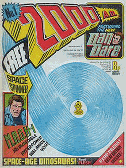
2000 AD Prog#1
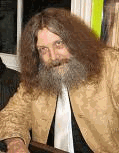
Alan Moore
I wrote a guest post on the Benjamin Wallace Books site recently about my inspiration for writing. It all came down to popping into a service station WH Smith where Prog#1 of 2000AD awaited me. Ironically, Alan Moore (whom I remember from 2000AD) wrote the introduction for the first book I was published in. Click here to read the post.








September 26, 2011
Mama, I'm coming home

Welcome Home, Janissary
David A. Cleinman interviewed me recently for his 'Works and Writings' site. I was talking about my short story Welcome Home, Janissary which is published as an eBook by Newcon Press. I'm very pleased with this story, which… Well you can read the interview to find out more about it, but here are a couple of extra angles:
I liked the story so much that I've just started writing a series of novels based upon its premise.
Welcome Home, Janissary connects several aspects of my writing life. A very early version was workshopped at Other Worlds Writers' Workshop (OWWW) and it was originally published by NewCon Press as part of their Further Conflicts anthology. NewCon Press is the mutant spawn of a tangent spun out from a writing group I still participate in: the Northampton Science Fiction Writers' Group.
BTW: The title of this post is both an Ozzy Osbourne song I've sung along to at Ozzfest, and what one of the main characters could well be saying as this story ends.








September 21, 2011
The unspeakable horror of Rudyard Kipling
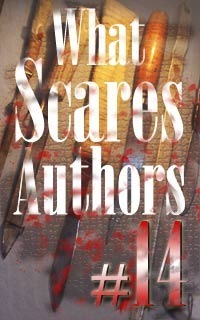 Horror writer Todd Russell has a cracking series of guest posts called 'What Scares Authors'. At the time I was working through my tax return. Well, that was pretty scary — still is — but maybe a bit too obvious. So I chose as my subject Rudyard Kipling and his Just So Stories. Find out why at Todd's website.
Horror writer Todd Russell has a cracking series of guest posts called 'What Scares Authors'. At the time I was working through my tax return. Well, that was pretty scary — still is — but maybe a bit too obvious. So I chose as my subject Rudyard Kipling and his Just So Stories. Find out why at Todd's website.








September 19, 2011
Guest Post: On writing and editing

Writing & editing
Welcome to author Arshad Ahsanuddin who has written us an article on writing and editing. It's an activity that sounds far less exciting than dreaming of fictional landscapes, or indulging in the free food and drink at a book launch, but is nonetheless a vital part of the journey toward a cracking good read and an interesting subject in its own right.
For old code monkeys like myself, there are also many parallels with software development. Design reviews, the agile manifesto, code review: all have their analogues in Arshad's article.
Over to Arshad…
So you have an idea for a book. Time to start writing. Some people would counsel to just sit down and start typing, and see where your muse takes you. This is referred to as "organic" or "seat-of-the-pants" writing. It works fine when you only have a germ of an idea or you're brainstorming. In my experience, however, a little preparation can make a world of difference in the quality of your first draft, and the degree to which the manuscript has to be extensively revised during the editing process.
Never write randomly. Always plan at least a skeletal outline, even if you only have a rough idea of where you want to go with the story, but leave the details to come out in the process of writing. It will stop you from writing yourself into corner more often than not, even if the finer points go right out the window once you start. You should have a clear idea of where you want to go, how you want to get there, and what you want to accomplish along the way. Then sit down and start writing, not before. Your outline will grow and adapt as you proceed. It should be frequently updated as more of the manuscript is completed, and divergences from your initial conception become apparent.
It isn't usually a good idea to edit your work extensively as you go, because you will probably get bogged down in revisions and never finish your manuscript. The other reason not to edit an incomplete manuscript is that you will be working to unify the themes and structure of the earlier parts of your manuscript based on what you intend to write in the future, not what you will actually write. If your ending veers off in another direction from your initial intentions, then your early editing efforts may become outdated. Therefore, the first stage of editing should only commence once the entire manuscript is written and the structure of the story is complete.
Once the first draft is finished, then it's time to start editing. There are three major forms of editing that I have identified: structural editing (also called developmental or substantive editing), line editing, and copyediting. The first two are most important to the neophyte writer, and the last is more a form of polish for the finished product before it goes to publication.

Arshad's novel 'Sunset'
Structural editing is the practice of evaluating the larger themes and narrative flow of the manuscript. The focus here is on the nuts and bolts of a manuscript in order to determine whether its overall architecture is thematically sound, and to identify existing deficiencies that can be remedied. Some key questions to be answered are whether plot, dialogue, characterization, and setting are fully developed and balanced; whether the overall themes of the work are consistently maintained; and whether point of view is consistent and appropriate.
Line editing is the basis of most writers' groups and focuses both on receiving critical appraisal of the quality of your writing. Key questions to be answered are whether your approach to any given passage is effective and engaging, whether your choice of words is accessible, and whether your dialogue is natural and believable. Generally, these analyses are based on excerpts of your work, and so do not have the same scope as structural editing, which focuses on the complete manuscript.
Copyediting is the technical review of language elements such as spelling, grammar, and punctuation which would otherwise detract from a well written manuscript as it moves forward to publication and distribution. In effect, structural editing is a review of the content of your manuscript, peer-critique is a review of its style, and copyediting is a review of its linguistic precision.
In the end, the writer is forced to critically examine his or her work, and decide what needs to stay, what needs to go, and what needs to be radically changed. Most likely, several follow-up reviews will be required to determine whether the revised manuscript has addressed the initial deficiencies, and whether new concerns have developed. The partnership between writer and editor should be viewed as a cooperative process, in which both work toward developing a good manuscript into a great one.
Thanks, Arshad.
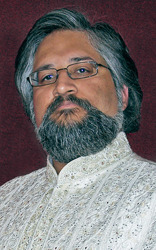
Arshad Ahsanuddin
When he is writing articles about editing, or adding to his Pact Arcanum novels, Arshad Ahsanuddin is a hematopathologist living in Canada. Yes, he's a blood doctor writing about vampires. The irony doesn't escape him. Sunset is his first novel, and the start of the Pact Arcanum series.
Here are some ways you can find out more about Arshad:
website: http://pactarcanum.com
Amazon.com Author Page: http://www.amazon.com/Arshad-Ahsanuddin/e/B004YNJKKA
Facebook Author Page: http://www.facebook.com/pactarcanum
Twitter: http://twitter.com/pactarcanum








September 16, 2011
Guest Post: Todd Russell's Fresh Flesh
Today I'm starting a series of guest posts from authors, readers, reviewers, publishers and other such interesting folk. You didn't want to hear from me all the time, did you?
First into my virtual interview studio to plonk himself down on my imaginary interviewee's couch is Todd Russell, a horror writer of many years who is due to launch his new novel, Fresh Flesh at the end of the month.
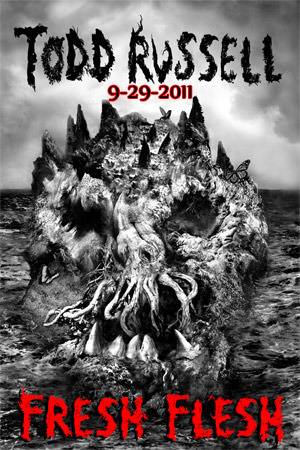 So, Todd, you've previously released a collection of horror flash fiction (Mental Shrillness). Now you're releasing a full novel. Sounds like one extreme to another; what made you write a novel?
So, Todd, you've previously released a collection of horror flash fiction (Mental Shrillness). Now you're releasing a full novel. Sounds like one extreme to another; what made you write a novel?
Firstly, thank you for chatting with me for a few minutes about my upcoming debut novel.
I love writing in all shapes and sizes. Flash fiction, short stories, novels, whatever the story dictates. I hope readers will soon see that my imagination is not bound by word count. Writing flash fiction is a good writing warm-up exercise and recently I challenged myself to write one new story every day (minimum 250 words). As of this writing, I've written 24 days in a row and 25 new stories (yes, one day I wrote two stories). How long will the streak go? Please tune in to find out at http://toddrwrite.com/
I like referring to flash fiction as beauty in brevity and it's a special type of fiction that I'll probably never tire of writing.
Novels are exciting because they allow me to paint on a gigantic canvas things that scare, thrill and hold me in suspense. I get to meet and know people–those wild and wonderful characters that inhabit my story worlds–and follow them and see how they are forever changed by the story. I love being surprised as much as readers.
I agree: writing novels can turn up surprises. Tell us about your new novel, and — I have to ask — why name it FRESH FLESH?
Shipwrecked Jessica Stanton is about to be discovered, cherished, and trained to survive on a remote island by a man who is not what he seems.
The first and second draft of FRESH FLESH was written eight years before any of the stories in Mental Shrillness. It's my third novel written but the one that landed me an agent when I was 20 years old. I love this story as much in 2011 as in 1989.
The story was originally written as a standalone novel but while finishing the third draft in 2011 I saw the possibility for additional stories that continue the journey in a compelling way. I would like to write many more FRESH series books and reader interest will help determine how fast and frequently I return to tell a new tale in the series.
I'm also considering using the same first draft writing dates each year to add (at least) one more story in the series. What intrigues me about this idea is I've never heard of any other next-in-series book being written this way before (has anybody else?). New experiments excite and challenge me.
I've liked the title FRESH FLESH since 1988 and feel it best describes the purpose of the island in a wide variety of ways. From the brief description of the book given above you can see a couple ways the title might apply. There is something in this book that every horror reader will enjoy as well as a fast pace to satisfy thriller fans.
Talking about the range of horror readers, there's been a lot of sexy vampire/ Twilight/ Buffy/ horror-lite recently, and I like some of that. There's been a lot of zombie outbreaks on TV and in books and I love a good zombie. Some of my horror-writing friends complain that between the hordes of lumbering zombies and the chick-bit zombie books, the 'other horror stuff' is getting squeezed. What do you think?
If readers love these types of stories and writers want to fill these needs? Rock on. Everybody wins when readers are reading and telling their friends to read
Okay, now don't say anything that will incriminate you with the police, but did you do any research for FRESH FLESH?
I've done more research for FRESH FLESH than any other story I've written to date, including the six other novels I've written. There are historic events referenced in the timeline that actually happened and have a fictional tie-in role in the story. There are a bunch of little things researched often boiled down to a sentence or two in the novel. These are spices for the stew and help with the realism.
Once FRESH FLESH has become a bestseller and you're negotiating the film rights, what will be your next book?
Thank you for the optimism!
My goal this year was to have 3-4 books available by the end of the year, so I'm hoping to get at least one more book out. It all depends on beta reader feedback and the editing process how fast my novels will be turned out. Of the six other completed novels I have, two need a small amount of work to be published, two need more significant work and two can only come out after I'm dead.
This year so far I've introduced readers to some flash fiction, one long short story ("The Illusion" in Mental Shrillness is 7,200+ words long), so publishing a novella would give readers a sample of my work at all word length.
Meanwhile, I have a few WIP that I'm excited about. I showed a friend of mine an idea I have for an YA book that has a gaming element to it and he thought the idea was intriguing.
That's impressive and writing a novel is hard work, right? Do you get to have a life? What do you do when you rise from your writer's coffin and step into the light outside (assuming you don't burst into flames)?
LOL, yes, I have a life. If you come to Orting, Washington, please look for my name on Foursquare. We sell autographed copies of my book in our insurance office. If you are a Washington resident you can get a comparative quote on your home, auto and business insurance needs.
Thank you again for the time and space. Much appreciated! Please let me know what you think of FRESH FLESH.
Thanks for talking with me, Todd. Fresh Flesh is out in paper and ebook formats on 20th September 2011. There is a drawing on October 17th at Goodreads for a free signed proof copy. Follow this link to enter the draw.








September 7, 2011
On the Importance of Making Things

D'oh!
I've been doing some thinking recently about where my life's headed. It's given me a bit of a slaps-palm-on-forehead moment, which I've decided to share with you.
Three things got me thinking:
Our friends rented us a beautiful holiday cottage in Barnard Castle; I didn't take a laptop and I wasn't connected. Great holiday and time to think.
It's now six months since I was made redundant. I've spent a fair chunk of that time writing and setting up a publishing business (Greyhart Press). Six months seemed a good time to step back and reflect.
The third kick was a tragedy, one of those shocks that shake you from complacency and puts perspective on your own life. Science fiction author Colin Harvey died aged 51. I didn't know him well enough to write an obituary and I don't want to talk about my connection with him, because that would feel too ghoulish. Suffice it to say he was a great writer and a family man with a big future ahead of him. And now he's gone. Read his books.
Back in February, after twenty years first writing software and then managing software departments (mostly 'change management' — Six Sigma or Scrum anyone?) I was desperate for a break from office politics. Despite a few highlights (like working with the Beard Team) I had thoroughly disliked my job for at least five years. I kept slogging away, getting increasingly stressed out for just one reason: to earn money to provide for my family.
So when my company made me redundant, it came as a blessed relief. I could take a year off to concentrate on writing science fiction, and the redundancy pay would help pay for a few months.

Our Lego
Just recently, I've spent a lot of time with my son over the summer holidays (there has been a lot of Lego building). That's been brilliant and not something I could have done before, but it's heavily fragmented my working time. And that has been bothering me because I didn't do any writing over the summer. Instead I've worked on editing books by other authors for release by Greyhart Press in our Fantastic Fall launch. I'd also spent time building eBooks for other publishers. Editing isn't bringing in any money (yet) and the eBook building brings very little.
Was I frittering away my writing time before the day comes when I have to get a more conventional job?
At first I thought so.
But that six months of distance from my old job gave me an unexpected answer. In the past fifteen years of work, I'd achieved some results that felt impressive at the time. I did things no one else in the organisation could do; I delivered things that are still important to the business that let me go, but not to me. Not any more. The last achievement that counts is a software product I architected, and for which I led the coding team. That was way back in 1996. That was the last time I made something.
So am I wasting my time by editing and building eBooks?
No.
I would have said 'yes' a couple of weeks ago but not now, because both activities give me the sense of satisfaction from having built something.
So, in a couple of months I'll start touting for business producing eBooks. It won't earn much and it will eat into the precious writing time that remains to me, but it will give me a sense of satisfaction. Colin's untimely death has been a powerful reminder for me of the importance of doing more than just earning money.
 My family can't eat sentiment forever, though. Almost certainly I will need to go back to a conventional job and this is not a good time for job hunting. In happier economic times I'm sure I could get a job with a slightly silly title, such as Software Quality Assurance Manager or Agile Evangelist. But my reflections have told me 'no'; I should seek jobs that I can look back on in later years and say that I worked on something that counted, that gave me a sense of satisfaction.
My family can't eat sentiment forever, though. Almost certainly I will need to go back to a conventional job and this is not a good time for job hunting. In happier economic times I'm sure I could get a job with a slightly silly title, such as Software Quality Assurance Manager or Agile Evangelist. But my reflections have told me 'no'; I should seek jobs that I can look back on in later years and say that I worked on something that counted, that gave me a sense of satisfaction.
I need to make things.
Tim









